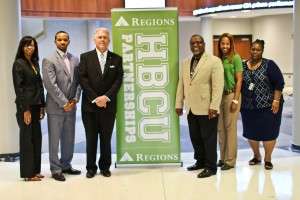
Ahead of National Financial Literacy Month in April, the College of Business at Jackson State University partnered with Regions Bank on Friday, March 20, to help students improve their understanding of financial concepts and services.
The Regions HBCU Partnerships Executive Lecture Series in the College of Business building drew dozens of students inquiring about such issues as student loan repayment, securing business loans, developing business plans and forecasting, as well as monitoring credit.
The panel included Alon W. Bee, city president of the metro Jackson area for Regions Bank; Shelia Jackson, a Regions assistant vice president and corporate trainer; and Christopher A. Wallace, a Regions vice president and regional credit process manager.
Dr. Donald Causey, moderator and professor in the College of Business in the Department of Entrepreneurship said, “Regions is one of our stakeholders, and Jackson State has a tradition of working with the community. This partnership helps our students build relationships with our community stakeholders and helps educate our students about the importance of personal financial management, banking and using credit.”

Bee urged students to be “very, very careful with credit. Always know exactly how you’re going to pay it back because hope is not a strategy.” Bee also offered advice about developing a business plan, urging prospective entrepreneurs to do their homework using numerous available resources. He suggested a three-year minimum business forecast.
Because the event gives students a chance to directly engage with industry leaders and participants for first-hand knowledge, Causey said, “JSU is working very hard to help students develop their business plans and concepts to see the importance of using equity and debt financing and understanding how to relate that to their concepts and overall planning.”
In addition, panelists dispensed valuable tips to attendees.
As for her participation, Jackson said, “These events are essential because students are our leaders of tomorrow. Business is in everything that we do. If we don’t educate our students to become better thinkers of financial education and literacy, then how is it going to serve our economy?” Furthermore, she said, “If we prepare our students for the real world and give them the necessary tools, it will change the economy and our employment rate because we will have better educated people entering the workforce.”
Jackson also urged students to pay creditors and loans, monitor credit and avoid being saddled with too much debt.
Wallace especially urged students to handle student loans refunds frugally and appropriately. “It’s not a refund check to go shopping.” The banker advised students entering the workforce to begin immediately thinking about retirement. “You don’t want to simply live for the moment. Talk to experts and get opinions to figure out the best direction to go. It will prevent you from making costly mistakes.”
Finally, Wallace said when evaluating the benefits of credit or cash, understand that “credit will always go further.”







